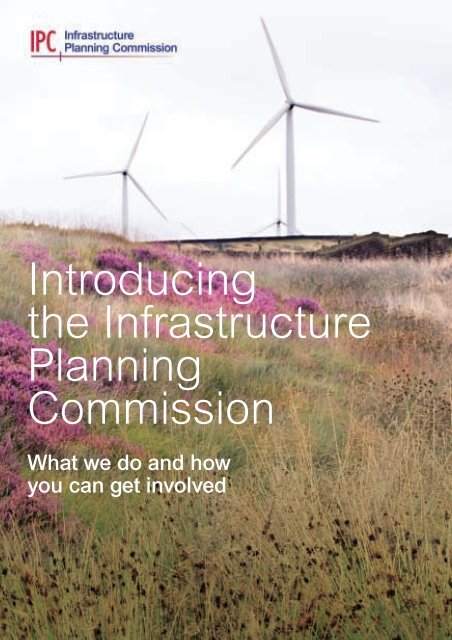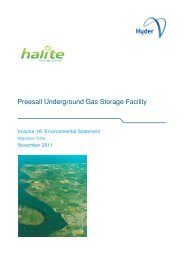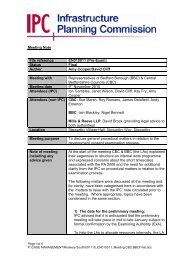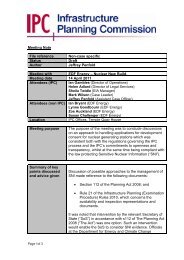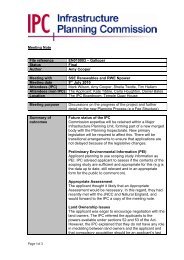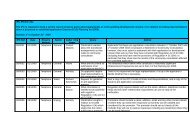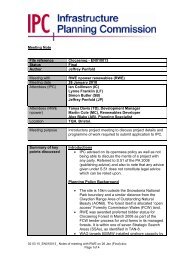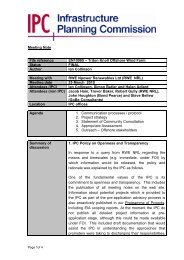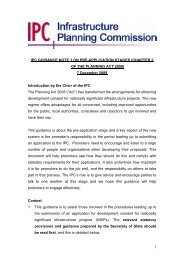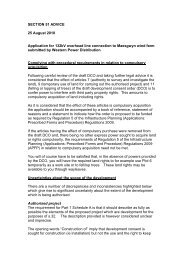Introducing the Infrastructure Planning Commission
Introducing the IPC – How to get Involved - National Infrastructure ...
Introducing the IPC – How to get Involved - National Infrastructure ...
- No tags were found...
You also want an ePaper? Increase the reach of your titles
YUMPU automatically turns print PDFs into web optimized ePapers that Google loves.
<strong>Introducing</strong><br />
<strong>the</strong> <strong>Infrastructure</strong><br />
<strong>Planning</strong><br />
<strong>Commission</strong><br />
What we do and how<br />
you can get involved
2 <strong>Infrastructure</strong> <strong>Planning</strong> <strong>Commission</strong><br />
The <strong>Infrastructure</strong> <strong>Planning</strong><br />
<strong>Commission</strong> (IPC) is a new<br />
organisation which will be<br />
at <strong>the</strong> heart of decision making<br />
on national infrastructure<br />
projects. These are <strong>the</strong> large<br />
scale facilities that support<br />
<strong>the</strong> economy and vital public<br />
services. They include railways,<br />
large wind farms, power stations,<br />
reservoirs, harbours, airports<br />
and sewage treatment works.
<strong>Infrastructure</strong> <strong>Planning</strong> <strong>Commission</strong> 3<br />
This booklet describes<br />
major changes in <strong>the</strong> way<br />
decisions are made on<br />
national infrastructure<br />
and how this might affect<br />
you. It is an introduction<br />
to <strong>the</strong> 2008 <strong>Planning</strong> Act<br />
and <strong>the</strong> new <strong>Infrastructure</strong><br />
<strong>Planning</strong> <strong>Commission</strong> (IPC).<br />
Individual applications<br />
for national infrastructure<br />
projects will be handled by<br />
<strong>the</strong> IPC. The new system<br />
has been designed to give<br />
<strong>the</strong> public, local authorities<br />
and interest groups much<br />
improved opportunities to<br />
get involved and make <strong>the</strong>ir<br />
views known.<br />
<strong>Commission</strong>ers, who are independent<br />
of government and all o<strong>the</strong>r interests,<br />
will examine <strong>the</strong> evidence for and<br />
against each project. They will be<br />
required to act in accordance with<br />
government policy as set out in National<br />
Policy Statements. These statements<br />
will consider national priorities and<br />
explain <strong>the</strong> case for investment in<br />
energy, transport, water and waste<br />
infrastructure.<br />
<strong>Commission</strong>ers will consider, for<br />
example, <strong>the</strong> environmental impact<br />
of each project put forward by a<br />
promoter and decide whe<strong>the</strong>r a project<br />
should be granted permission and if<br />
so under what conditions. There are<br />
six main steps in <strong>the</strong> decision-making<br />
process which are described on <strong>the</strong><br />
next two pages.
4 <strong>Infrastructure</strong> <strong>Planning</strong> <strong>Commission</strong><br />
IPC decision making.<br />
The six steps<br />
The IPC has 28 days to<br />
decide whe<strong>the</strong>r <strong>the</strong>re has<br />
been effective consultation<br />
and whe<strong>the</strong>r <strong>the</strong> application<br />
meets <strong>the</strong> required standards.<br />
Pre-application<br />
Acceptance by <strong>the</strong> IPC<br />
Pre-examination<br />
Look out for early information<br />
in local media and in public<br />
places near <strong>the</strong> location of<br />
<strong>the</strong> proposed project, such as<br />
your library. The promoter will<br />
be developing <strong>the</strong>ir proposals<br />
and will consult widely. You<br />
may also wish to talk to your<br />
local authority and local<br />
interest groups.<br />
You can now register as an interested party;<br />
you will be kept informed of progress and<br />
opportunities to be involved. <strong>Commission</strong>ers will<br />
hold preliminary meetings and set a timetable.
<strong>Infrastructure</strong> <strong>Planning</strong> <strong>Commission</strong> 5<br />
A decision on <strong>the</strong> proposal is<br />
issued within three months, with<br />
a statement of reasons.<br />
Examination<br />
Decision<br />
Post-decision<br />
You can send in your comments<br />
by writing and can speak at a<br />
public hearing. The IPC has<br />
six months to carry out <strong>the</strong><br />
examination.<br />
There is a six-week<br />
period for legal<br />
challenge.<br />
We have produced a booklet The <strong>Infrastructure</strong> <strong>Planning</strong> <strong>Commission</strong>: Guide to its<br />
Role and Operation which examines our processes in more detail alongside <strong>the</strong> legal,<br />
national policy and historical context of our operations. You can request this using <strong>the</strong><br />
contact information on <strong>the</strong> back cover.
6 <strong>Infrastructure</strong> <strong>Planning</strong> <strong>Commission</strong><br />
National Policy<br />
Statements and<br />
<strong>the</strong> need for<br />
national<br />
infrastructure
<strong>Infrastructure</strong> <strong>Planning</strong> <strong>Commission</strong> 7<br />
Our decisions on<br />
applications for national<br />
infrastructure will be<br />
guided by National Policy<br />
Statements (NPSs). There<br />
will be NPSs on renewable<br />
energy, transport networks,<br />
nuclear power, aviation,<br />
water supply and several<br />
o<strong>the</strong>rs. These are prepared<br />
by <strong>the</strong> relevant government<br />
departments. This is<br />
important, because it means<br />
that <strong>the</strong> decision maker (<strong>the</strong><br />
IPC) is separate from <strong>the</strong><br />
government policy maker –<br />
ensuring that our decisions<br />
are fair and objective<br />
NPSs establish <strong>the</strong> national need<br />
for each type of infrastructure. They<br />
may also identify potential locations<br />
for infrastructure facilities and <strong>the</strong><br />
factors for judging if a location which<br />
is proposed by a promoter is suitable.<br />
This will provide a clear statement<br />
of government policy and allow <strong>the</strong><br />
applications which we examine to be<br />
decided more quickly.<br />
You can find out more about <strong>the</strong><br />
different NPSs, including when <strong>the</strong>y<br />
will be produced and how you can<br />
have your say, on <strong>the</strong> Directgov<br />
website at www.direct.gov.uk/<br />
infrastructureplanning<br />
The Department for Communities<br />
and Local Government (CLG) has<br />
produced a leaflet which explains <strong>the</strong><br />
new planning system: <strong>Infrastructure</strong><br />
planning: How will it work? How can I<br />
have my say? You can request a copy<br />
by calling 020 7944 4400 or visiting<br />
www.communities.gov.uk/planningand<br />
building
The IPC is part of an<br />
infrastructure planning<br />
system 1 which will:<br />
• simplify <strong>the</strong> process for all<br />
concerned;<br />
• provide better opportunities for <strong>the</strong><br />
public, objectors, consultees and<br />
promoters of national infrastructure<br />
to present <strong>the</strong>ir evidence and<br />
explain <strong>the</strong>ir point of view;<br />
• promote better planning and<br />
sustainable development to respond<br />
effectively to climate change;<br />
• apply professional and technical<br />
judgement, independent of<br />
government and all o<strong>the</strong>r interests;<br />
Contact us<br />
For help and advice visit our website:<br />
www.independent.gov.uk/infrastructure<br />
To speak to a member of <strong>the</strong> IPC about<br />
a proposal, call our helpline:<br />
0303 444 5000<br />
Email us at:<br />
ipcenquiries@infrastructure.gsi.gov.uk<br />
Or write to us at:<br />
<strong>Infrastructure</strong> <strong>Planning</strong> <strong>Commission</strong><br />
Temple Quay House<br />
Temple Quay<br />
Bristol<br />
BS1 6PN<br />
• reduce <strong>the</strong> average time taken for<br />
major applications, from making an<br />
application to final decision, to less<br />
than a year; and<br />
• cut <strong>the</strong> overall cost of <strong>the</strong> planning<br />
system for national infrastructure by<br />
around £300 million per year.<br />
1 The new system applies across England and<br />
to some cross-border oil and gas pipelines into<br />
Scotland. In Wales <strong>the</strong> new system will only<br />
apply to ports and energy applications<br />
Published by <strong>the</strong> <strong>Infrastructure</strong> <strong>Planning</strong> <strong>Commission</strong><br />
© Copyright 2009 <strong>Infrastructure</strong> <strong>Planning</strong> <strong>Commission</strong><br />
298382<br />
ISBN 978-1-907398-00-1


